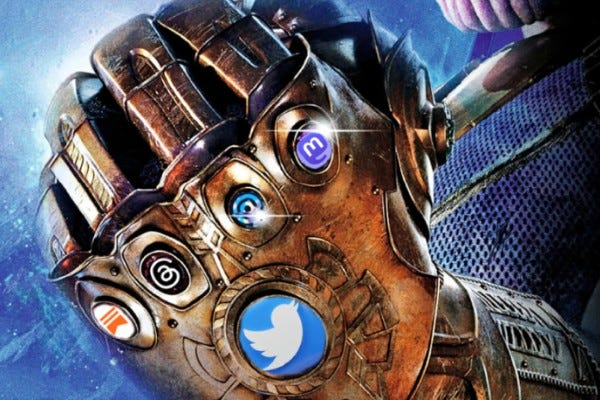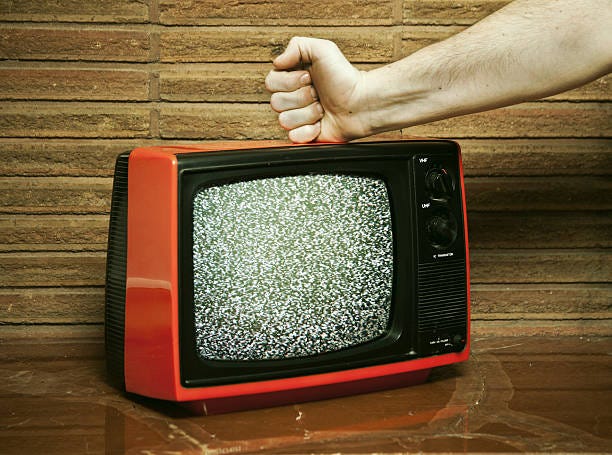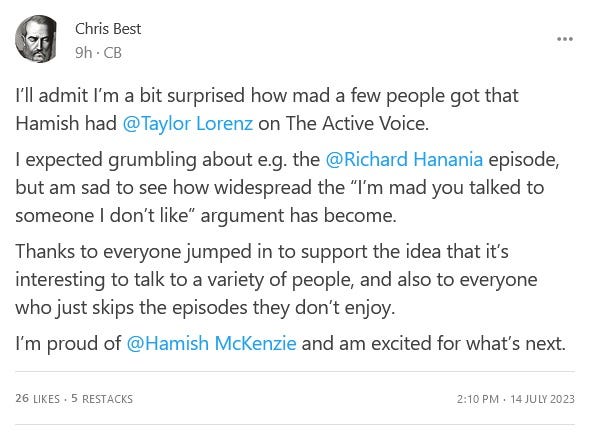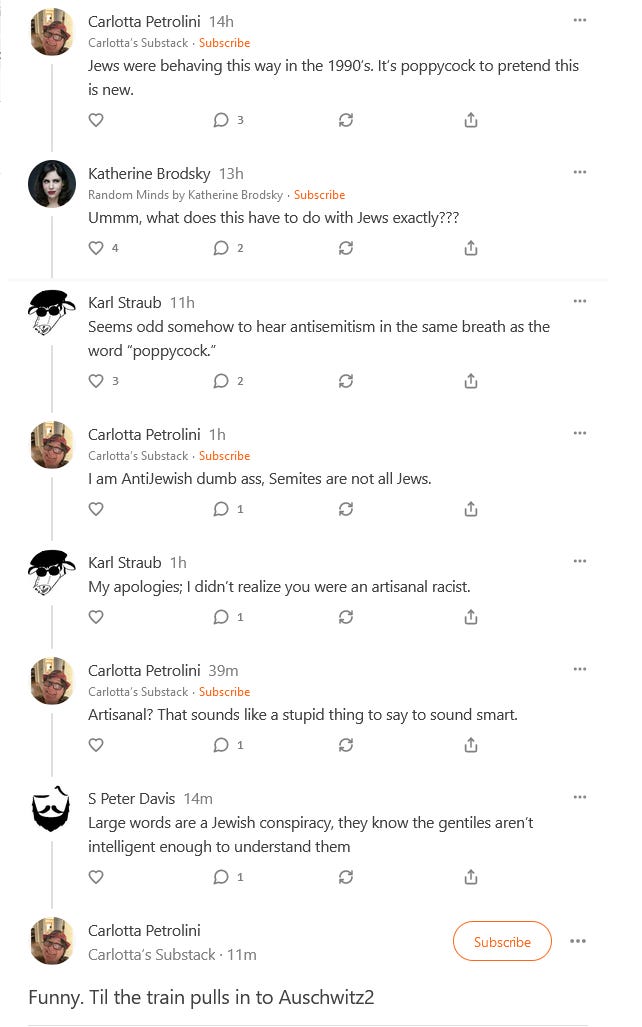The Year of Five Twitters
For social media to work, it needs to be wrested away from its despotic ideologues and their dumb social experiments
Twitter is on life support.
In retrospect, Twitter had become such a precariously huge and unstable monster of a thing that it was bound to fall apart. If a comet hadn’t struck the Earth then the dinosaurs, despite being the most successful animals to ever live, would have died out under their own bloated and ponderous enormity. It was a matter of time.
But a comet did strike. Its name was Elon Musk. And like the one that killed the dinosaurs, it didn’t strike during its victim’s decline, but at its peak. You needed an Elon Musk—a cataclysm—to take out Twitter. Anything short of that could only bruise it. He shattered it.
Before November of 2022 there were no Twitter alternatives that you could, with a straight face, call competitors. The three biggest were, all of them, somewhere on the spectrum of the political extreme right—from the most respectable, Donald Trump’s Truth Social, to Parler which was a more Kanye degree of fascism, to Gab, which is literal Stormfront with more Pepes and Marjorie Taylor Greene.
Less than a year after the comet hit, there are four mainstream and ostensibly politically neutral anti-Twitters. With the exception of Mastodon, all of them have sprung up since February as a direct result of enormous cracks appearing in Twitter’s market monopoly. And this was not by design—indeed, Musk was trying to strengthen that monopoly, resorting as he did to occasionally anti-competitive measures to try to prevent people from using any other platform.
So what happened? Twitter, with the right kind of business mindset, could have printed money. But Elon Musk doesn’t have a good business mindset. His success in achieving dizzying amounts of wealth can largely be compared to winning the lottery twice—an incredibly rare but not quite impossible feat. He bought a company just before its value skyrocketed due to demand for its concept, and then used the profit to do that a second time.
When it comes to the actual running of those businesses, however, his strategy is extremely simple. He brute forces it. He identifies the biggest problem facing the company’s ongoing success and simply yells at people and threatens them until they fix it, and if that doesn’t work, he throws an insane amount of money at it. He’s the businessman equivalent of Al Bundy smacking the TV to make it work.
That’s something that sets Musk apart from other billionaires—he spends his money. He fully recognises its power, and he knows that anything is for sale. That is, after all, how he got Twitter. He offered an amount of money that was so ludicrously far above what the company was worth that it was actually illegal for them not to sell it to him, by the laws of public trading.
And he spends because there’s something that matters to him more than money. He wants his name in the history books. Shit, he wants his face on the cover of the history books. If it wasn’t obvious from the way he seeks to break Genghis Khan’s breeding record, he wants to leave part of himself behind long past his mortal expiration date. He’ll do what he usually does when there are obstacles in his way. Brute force.
Those obstacles include the media and the public perceptions he believes are shaped by it.
Musk’s James Bond villain plan for Twitter was too bold. He wants ultimately to eliminate journalism as a profession and replace it with an army of curated “fact-checkers” vetted for loyalty via an $8 fee on a platform he controls, marshaled by a dubious bunch of celebrity journalists-at-large like Matt Taibbi and Tucker Carlson, whose ideologies are for sale to the highest bidder. And there’s no higher bidder than the richest man on Earth. If he controls the media then he thinks the rest will move into place much easier. He sees the whole world like a malfunctioning SpaceX rocket—an engineering problem.
But being Elon Musk’s engineering project is exhausting. Twitter now feels like that Simpsons episode where the summer camp is taken over by a totalitarian who recruits the school bullies to run the place and serve the kids gruel. Musk sees the users as his employees building his grandiose pyramid, and it’s no fun being put to work while he and David Sacks and Ian Miles Cheong sit around in the presidential suite, emerging now and then to throw peanuts at us and call us cucks.
It is no wonder people want to leave. Musk’s biggest miscalculation was thinking we were all craving a strong alpha boss-man to neg us into submission and beat the soy out of us. Instead, half a dozen other groups, from startups to established megacorporations, sensed weakness and launched into plans to replace the wounded beast with promises of a browsing experience that wouldn’t make us regret waking up in the morning.
Now the social media landscape is all spread out before us like puzzle pieces thrown from the box and those of us who are kind of trapped by the necessity of connecting with social media to do our jobs find ourselves in this relentless and Sisyphean nightmare of having to navigate and interact with, at minimum, six identical fucking apps. It’s an absolute nightmare.
There’s still no very clear winner in the Twitter Wars. Each has its own pros and cons. The real mystery is why the people running these experiments are finding it so difficult to strike what exactly it is that the people want out of this whole thing. I’ll tell you what it is right now: The ideal social media platform is the one that feels the least like work.
This is, after all, supposed to be leisure time. It’s supposed to be fun. Most of us have real work to do, and we don’t want to spend the rest of the time labouring in some billionaire’s algorithmic rat maze because he has it in his head that he’s building a race of sycophant Übermensch to build statues of him on Mars.
The work problem was the failing of Mastodon, the first alternative that people flocked to because it was already there and looked kind of like Twitter. But Mastodon isn’t like Twitter in the sense that you can’t just create an account and log in and see everyone. It’s a federated platform. What does that mean? Most people can’t tell you. I can’t tell you. I can only speak in half-baked analogies. Where Twitter is like one gigantic party, Mastodon is more like a block party, or a pub crawl. It’s technically the same party, you can find people and hang out with them if you know which house they’re in, or you can talk to them on the phone while you’re in two different houses, but every house has its own rules and after a few hours you can’t remember which one you left your car at.
Mastodon is great for the people who have been using it since 2016 and preferred whatever is going on over there over what is affectionately known as the Hellsite. But the Mastodon community that was already established didn’t really appreciate the sudden flood of Twitter users. To them it was like an invasion, thousands of people with their own culture gatecrashing an established party and asking stupid questions about how it worked.
Over on Twitter, Musk made linking to or discussing Mastodon a bannable offense in order to dissuade people from networking and finding each other on what he feared was a rival platform, but it was a non-starter nonetheless. It couldn’t offer what the Twitter diaspora was missing from their native land—simplicity of use. There was work involved here.
Then Substack, the platform that’s bringing you the column you’re reading right now, took everyone by surprise by launching Notes. For most people, the first they heard about Notes (or in many cases Substack itself) was when Elon flipped his shit about it and imposed a ban on links to anywhere on this site, a ban that holds up to this day to the immense frustration of writers including myself. The fact that he was so angry led people to believe with hearts aflutter—and mistakenly, it turned out—that this was the next Twitter. It’s very obviously modeled on Twitter. It looks exactly like Twitter.
But that didn’t last long either as people learned quickly that Notes was not equipped, or intended, to be a Twitter clone. I use Notes, probably more than any of the other social networks barring Twitter itself, but it’s very much a writers’ and readers’ hangout. It’s cozy. It’s like a log cabin writers’ retreat. There isn’t even a mechanic to follow people without also subscribing to their newsletter.
Oh yeah, and it’s also full of Nazis.
See, the Substack devs revel in the kind of nauseating techbro libertarian ultracentrism that leads them to believe that you can throw a dart at the broadest imaginable political compass and whatever opinion it lands on is going to be equally valid, interesting, and exciting.
That means you have to do all your own moderation. Because you’ll be chatting away casually with your buddies and then all of a sudden some dollar store Richard Spencer like Christopher Brunet shows up. Or Ku Klux Klandma.
It’s impossible to scale that up to anywhere near a fraction of what Twitter is and does. Because it’s work. It’s too much work.
This brings us to Bluesky. The next brainchild of former Twitter boss Jack Dorsey, the guy who sold us all down the river. That could be forgiven if only he can deliver a refuge. Bluesky is not yet open to the public, relying instead on a slow trickle of users brought in by invitation.
Bluesky tries to express that it’s not really a social media platform so much as a technology similar to Mastodon in beta testing. It doesn’t even have a logo—icons related to the website and app are all just either solid blue squares or photographs of clouds. But its superficial similarity to Twitter, much moreso than Mastodon, as well as its connection to former staff of the pre-Elon Twitter, has people enthusiastic that it might be the true Twitter 2 that people unable to fully let go have been eager for.
But this unintentional reputation has led to Bluesky becoming the most political of the Twitter alternatives. Those who have the least problem with the politics of “Twitter 2.0” have tended to stay on it, while those who feel the most off-put or even downright unsafe, like many marginalised groups, populate Bluesky like a caravan of desperate refugees.
And the developers very clearly do not know how to handle this. Through the natural separation of oil and water that came from the acid drop of Twitter management’s sudden ultra-politicization, the Bluesky devs have found themselves unwittingly housing a very left wing and extremely diverse diaspora of pushed-out Twitterers, who are, at the same time, some of the funniest and best shitposters on the internet, but also extremely allergic to white libertarian techbro bullshit.
Just the other day, for example, the whole platform went to hell because some dipshit discovered they could sign up with a username that is just the N-word. Not even any creative use of it, mind you, just the word itself, hard-R, as a username. They were able to do that due to an astronomical failure of the developers to apply even the most basic psychological safety concepts to an entire community platform they built.
Once again, there is work involved where it shouldn’t be, where people just want to hang out and chill. Friction between the clueless devs and their userbase frequently sees the entire community flip-flop between a fun place to hang and an absolute shitfest of flying furniture and broken windows.
You don’t know which it will be on any given day.
So we come at last to the final port in a storm. To everyone’s horror, it is Mark Zuckerberg. The man who ruined everything to begin with.
Arguably the only reason Twitter became really popular in the first place was that it wasn’t Facebook. Mark Zuckerberg reminds me of one of Neil Gaiman’s American Gods, if he is the embodiment of personal data and intrusive advertising. With the damage this little shit did to the internet, to the political landscape, to everything, it was going to be one hell of a mammoth accomplishment to rehabilitate his image, but he found a way with Threads, the brand new app that people are calling the “Twitter Killer.”
You know why? Because it’s Twitter without work.
Threads, like every other Meta product, wants to take over your life. It wants to install itself on your phone so that its tentacles can dig in and down like roots following a system of pipes in search of water. It wants your full name and phone number and home address, it wants the names of your friends and parents, it wants to tattoo ads directly onto your retina so that you see them while you sleep.
But there’s no work. Threads is built on top of the Instagram platform so you don’t even need to sign up if you have any other Meta/Facebook connection. It’s shiny and corporate and it doesn’t ask you to be anything more than a consumer. Zuck doesn’t try to force you to humour whatever weird dogshit political ideology he has floating around his wormy brain. He just wants to make money.
And it’s working. Even people whose lives are markedly worse off from the very existence of Facebook are flocking to Threads because, unlike Twitter, looking at it doesn’t make you feel like someone is spraying poison into your eyes. The more I think about it, the more I think that rescuing Zuckerberg from a well-deserved self-immolation is the worst thing Musk has ever done.
What will kill Twitter, ultimately, is Elon Musk’s futile self-delusion that he can herd the entire world and its people like cattle. That people want to do work for him.
We get enough of that shit in our day jobs.














Loved this piece!
Nice roundup. Been meaning to check out your work. Subscribing now.